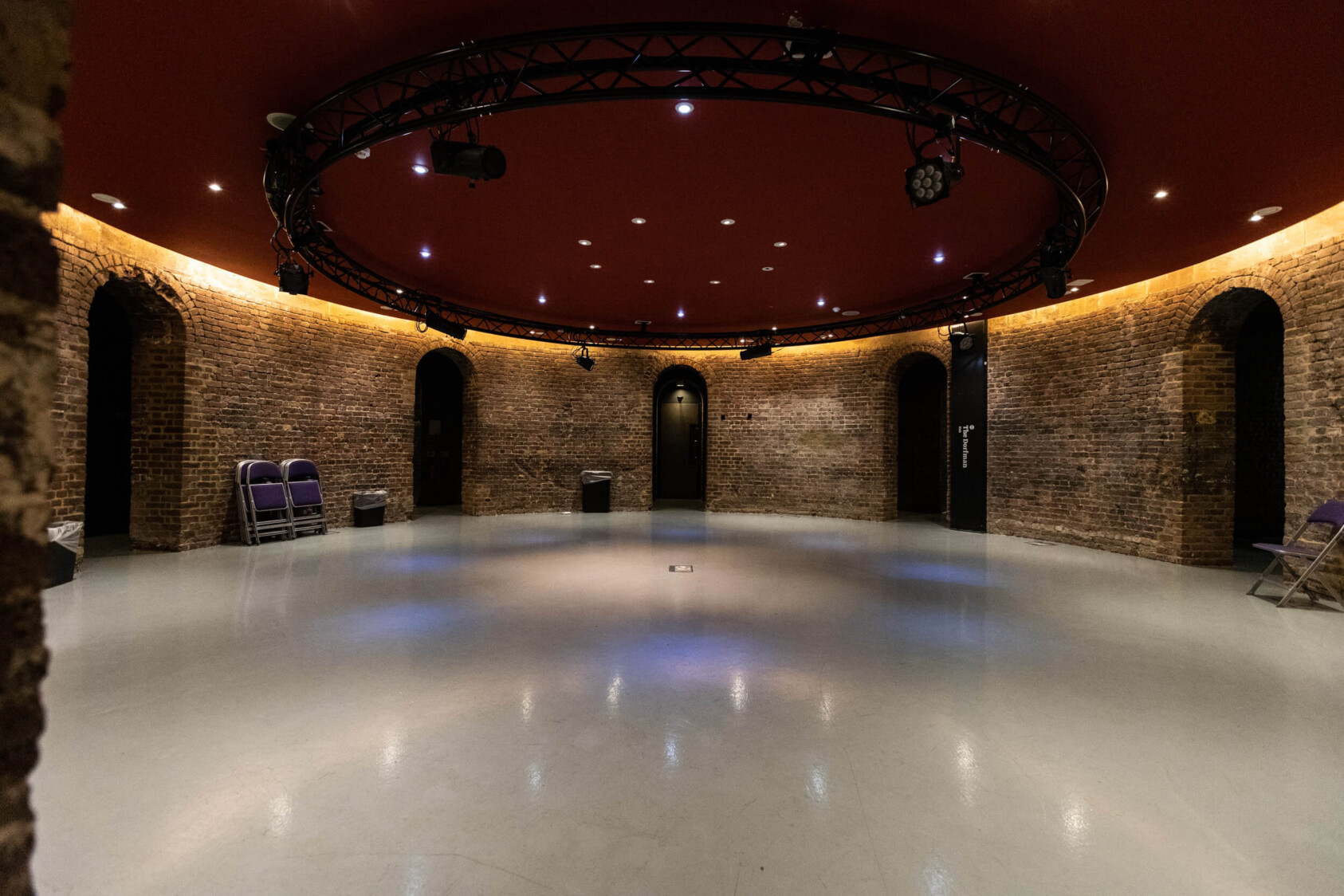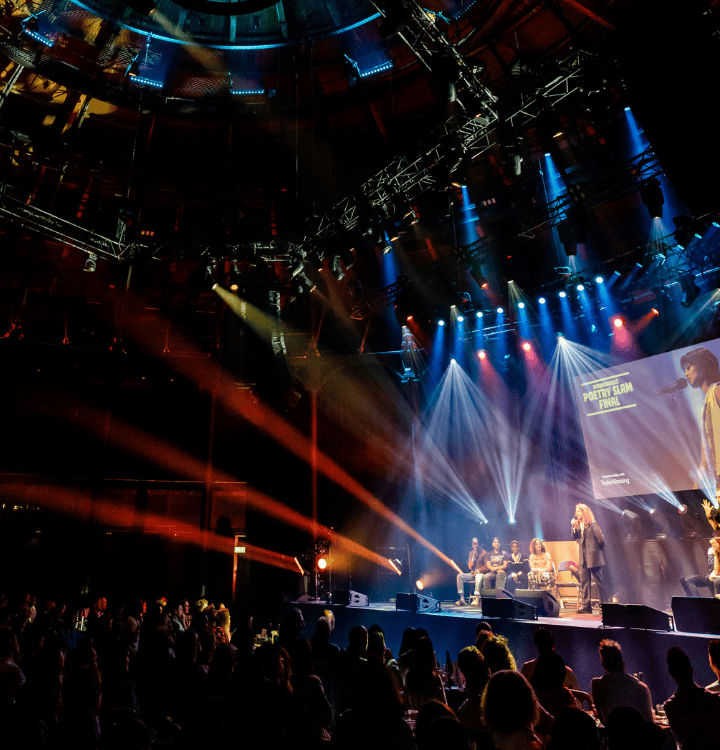11 April 2025
When the Roundhouse held its first Slam in 2006, competitive poetry in the UK was a fledgling artform, recently imported from the US scene.
Now – ahead of the 20th ever Slam Final on Thursday 17 April – after 19 champions, 57 judges, and over 200 poems, we’re looking back at the history of the Roundhouse Slam, and its place as one of the most important and impactful platforms for spoken word in the UK.
It’s 2006: Daniel Craig has just made his debut as James Bond, MySpace is king, and US President George W. Bush just addressed then Prime Minister Tony Blair with the greeting “Yo, Blair.”
It was also the first year of the Roundhouse Poetry Slam.
After several years of a successful Tower Hamlets iteration, a new scheme of ‘Summer Universities’ was launched across London. Thousands of 11-16 year olds in boroughs including Camden were invited to sign up to a wide range of courses such as media, arts, music, work, sports, IT, and personal development.
The Roundhouse, which had recently reopened after two years of renovations, joined the initiative and offered several courses – including a Poetry Slam.
The first Roundhouse Poetry Slam was held in the space now known as the Dorfman Hub, a maze-like circular area directly below the Roundhouse’s iconic main space, with a capacity of 40 people.

From the beginning, organisers set out to make the Slam a competition that wasn’t too competitive. Sharing ideas and perspectives was always embedded as the most important aspect of the Roundhouse Poetry Slam, with judges meeting with all performers after the Final to offer advice and feedback. This energy of collaboration and community went on to be the foundation of the Slam for the following twenty years.
Over the next few years, the Slam continued to build its reputation within the London poetry community, supported by the new Roundhouse Poetry Collective, a year-long development programme for young writers and performers to create, experiment and develop their craft.
On Saturday 6 August 2011, riots broke out across London following the police shooting of a man in Tottenham two days earlier. For five nights, civil unrest burnt through the city, with a significant outbreak in Camden.
The first heat of the Roundhouse Poetry Slam still went ahead the next day. Producers considered cancelling it, but ultimately decided it would be more valuable to provide participants with a creative outlet to respond to the recent events.
Performers were offered the opportunity to perform at a later heat instead, but the majority chose to go ahead with the event that night. Most of the young people rewrote their work that day to reflect the week’s events. The energy that night, by all accounts, was electric.
This is just one example of how the Roundhouse Poetry Slam is an archive of life – since its beginnings, performances have been shaped and dictated by what life is like for young people in the UK at that time. Performances at the Slam immortalise in verse the issues young people are facing at that time, alongside timely details from what type of phone people are using to the clubs they’re frequenting.
The Roundhouse Poetry Slam is also a snapshot of what’s happening in the spoken word scene; also in 2011, just a few short weeks after the riots, the Slam Final was judged by Kae Tempest. Kae’s 2014 spoken word album was nominated for a Mercury Prize, and they are considered one of the leading UK poets alive today.
2012 saw the Slam move to a new home in the Roundhouse Studio Theatre, more than doubling its capacity. This year was also notable for featuring Jack Rooke, creator and writer of Chanel 4’s Big Boys, as a finalist – however he was unfortunately disqualified for falling foul of Slam rules, though his exact breach is now a topic of debate. Luckily, Jack has returned to work with the Roundhouse, becoming a 2014/15 Resident Artist, and launching SHOW HOLE, a club-cum-cabaret-cum-comedy night in the 2025 Roundhouse Three Sixty festival.
The Slam soon outgrew the Studio Theatre, and moved into the iconic main space for the first time in 2014 – a move that cemented the Slam as a vital part of the Roundhouse’s annual calendar. Moving into the main space, which has seen the likes of Bob Dylan, David Bowie, Adele, Jimi Hendrix, and Amy Winehouse, made the Roundhouse Poetry Slam Final a truly unique experience for young creatives.
The first main space Final was won by Vanessa Kisuule, who went on to win another nine Slam titles in the UK and internationally. The second season of her podcast The Poetry Detective aired on BBC Radio 4 in early 2025.
In 2015, the Roundhouse Poetry Slam Final was held on Thursday 7 May – the same day as the general election. The crowd noticeably shifted halfway through the night when the Conservative Party’s unexpected majority became clear. Caleb Femi won the night with his performance of ‘Children of the Narm’, dedicated to the young community of Peckham.
A year after his Slam win, Caleb Femi was chosen as the first Young People’s Laureate for London, a post reflecting the growing interest in promoting the intersection of poetry and youth.
In 2017, five years after performances were first filmed, the Slam had its first viral moment, when Suhaiymah Manzoor-Khan’s performance of ‘This is not a humanising poem’ was viewed over two million times online, a breakout that led to her becoming one of the most in demand writers and performers of her generation. Suhaiymah’s debut play Peanut Butter & Blueberries had a sold-out run at London’s Kiln theatre in 2024.
The Slam had another viral moment in 2018, when runner up Reece Lyons’ performance ‘I am a woman and I have a penis’ was viewed over four million times online. Reece went on to win an Off West End Theatre Award for Lead Performer in 2022 for Overflow at the Bush Theatre.
The Roundhouse Poetry Slam went regional for the first time in 2019, with heats held in Gloucester and Hull as well as in London. From this first year, the Roundhouse made a commitment to work with local poetry organisations to produce regional heats, ensuring that they honour the communities they are trying to reach. When identifying possible heat locations, the Roundhouse team looks for places in the UK that have poetry scenes but don’t already have slams or other competitions.
Over the years, heats have also been held in Glasgow and Wrexham, and in 2025 visited Liverpool, Leeds and Bristol, as well as holding an online heat for those who couldn’t attend in-person.
2019 was also the first year to feature a live audience vote for their favourite performer, which was fittingly won by Tierney Eliot, who came to the Final via the first ever Gloucester heat.
The Roundhouse Poetry Slam was initially cancelled due to the pandemic in 2020, and producers considered skipping a year entirely. The Roundhouse team eventually decided, however, that they didn’t want to miss a year of artists; as poetry still happens in a time of Covid, so too should the Slam. The heats were held entirely online, but the Slam Final marked a triumphant return to live events for the Roundhouse, as the first in-person event held after 262 days of closure.
In 2022, Caleb Femi, winner of the 2015 Slam, had his debut collection Poor added to AQA’s English Literature GCSE syllabus in the UK.
2023 saw the Roundhouse enter a trailblazing five-year partnership with Taylor Wessing, whose dedication to supporting the Slam has seen it grow exponentially.
Heading to Leeds for the first time, the 2024 Slam saw Birmingham’s Bradley Taylor win the Slam and West Yorkshire’s Zara Sehar take out the audience vote, both of whom came to the Final from the Leeds heat. Bradley credits his Slam win with allowing him to become a full-time poet, leading to commissions and paid poetry work across the UK.
And now, in 2025 the Roundhouse is gearing up to celebrate its 20th Poetry Slam Final. The competition is now an established launchpad for creators, acknowledged for its ability to give a voice to young people.
The core of the model is unchanged; three heats in London and a Final, a culture of collaboration and support which ensures that winning is a bonus and not a pinnacle. But the Slam has also outgrown two different venues within the Roundhouse estate to find a home in the colossal main space, and the three London heats are now accompanied by three regional and one online heats.
The 2025 Slam received almost 300 entries – more than ever before – with 73 poets invited to perform at the seven heats. Also for the first time, all three regional heats sold out, ensuring that the reach of the Roundhouse Poetry Slam is stronger than ever. The Final will also be broadcast live on the Roundhouse YouTube channel by young creatives participating in the Roundhouse Behind the Lens course in live TV broadcast and content creation.
The Roundhouse Poetry Slam is now recognised as a key stepping stone for young poets in the UK – in the words of poet and host of the 2025 Leeds heat Matt Abbott, “As a poet, the Roundhouse Slam is one of the first things you look to. It is how you educate yourself, it is how you discover new voices – it is our Oscars.”
The Final on Thursday 17 April is set to be another triumphant moment for the Roundhouse and for spoken word poetry, but it’s clear that the strong values and community will ensure that it is not going anywhere.
